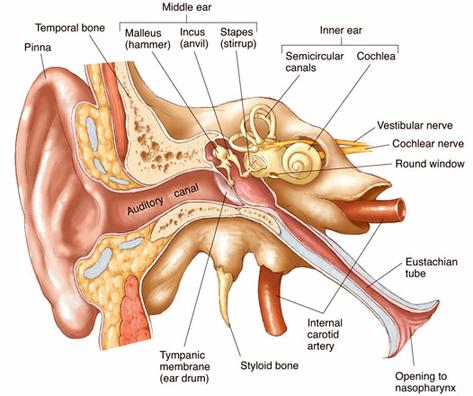What is Barotrauma? In general terms it is an injury to organs due to the change in atmospheric pressure. In this post, I will concentrate on Ear Barotrauma. I had my first encounter with this phenomenon in my early 20s. I was visiting friends who lived in Phoenix and we went to Flagstaff for the day. As we were returning down the mountain, we changed our elevation by nearly 6000 feet in approximately an hour. I was in the beginning stages of a cold and I was having a hard time clearing my ears. I had to blow my nose often due to the drainage starting from my cold as well as having plugged ears. If you have met me you know I am an all or nothing type of person, and when I do something I give my all. This includes blowing my nose! One aggressive blow and I had vertigo like nobody’s business. Thankfully I was not driving! I also thought it was a pretty cool feeling. But then I got to thinking, what if I were driving or were alone? It would not be so awesome then.
What happens during Ear barotrauma? I’ll explain. In order for our middle ears to work properly, the air pressure in them must be the same as the air pressure outside our body. It is the job of our Eustachian tube, which connects the middle ear to the throat, to constantly maintain proper air pressure in the middle ear. If you have a cold, change your altitude, or have a physical condition that causes blockage of the Eustachian tube, you can experience barotrauma.
The symptoms are:
- Ear discomfort or pain in one or both sides
- Slight hearing loss (conductive in pathology)
- Feeling of fullness in ears
- Dizziness
Severe/prolonged
- Ear Pain
- Moderate/severe hearing loss (if contained to middle ear, conductive in pathology)
- Nose bleed
- Feeling of pressure (similar to under water)

Extreme middle ear barotrauma can lead to inner ear barotrauma, which is much more dangerous and severe. If the pressure changes at such an intense level, the “wave” can travel to the round and/or oval window of the inner ear. This happens most commonly with scuba diving, but in rare cases patients have reported it on airline flights. In many cases a fistula forms in the round window, which often heals spontaneously within a week or two. But if the round window ruptures, that results in permanent hearing loss due to the loss of the perilymph fluid from the cochlea. This hearing loss is sensorineural and permanent in nature. I will explain why the perilymph fluid is so vital to our hearing in my next post!







I have hearing loss in both ears. The last time I flew on an airplane I felt awful pain and pressure the entire flight and for most of the drive back home. I’m not sure whether or not this is what I was experiencing, but it was the first time it had ever happened.
Yes, Carol, that is barotrauma, a milder form but painful and annoying non-the-less. It is best to start clearing your ears before you feel the pressure building. Chew gum, swallow, do the Valsalva as soon as the plane is going down the runway. The longer you wait the harder it is to equalize the pressure. This is why babies usually cry on the plane, they can’t clear their ears!
This happened to me when I flew out to Portland, OR from Atlanta for a job interview. I didn’t know the name for what was happening. The stewardess brought me a steaming paper towel in a styrofoam cup to place over my aching ear–relief. At the interview, though, I still couldn’t hear out of that ear and instead covered with “I had a cold.” So now I have a name for it. FYI, the lowered barometric pressure also affects my chronic post-nasal drip; I can tell when the weather’s changing. Here’s to hearing!